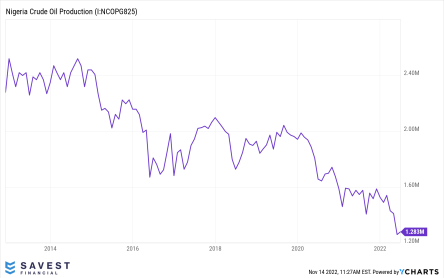Last week, the Naira gained almost 25% at the unofficial exchange rate markets, surprising many speculators. The change in fortunes for the Naira follows the Nigerian authorities hounding currency dealers in the parallel (black) market and individuals seeking to launder Naira through them.
The decision of the Central Bank of Nigeria (CBN) to redesign the N200, N500, and N1,000 Naira denominations spooked the Naira, sending the exchange rate crashing to almost N900 per US dollar. Many already see the greenback as a safer bet in the face of the country’s political and economic uncertainties. Added pressure from individuals seeking to launder their Naira to circumvent the recent policy, initially worsened the prospects of the local currency, until the recent bounce-back.
Is this recent strengthening of the Naira sustainable?
I do not think so, and here is why
The central bank does not have enough foreign exchange to meet everyone’s demands. To manage its paltry reserve, the apex bank adopts a very tight control of the foreign exchange supply, being the sole determinant of who gets and doesn’t. This tight control excludes many individuals and businesses from accessing foreign exchange in the official market, where the exchange rate closed at 441.83 on Friday. The result is that a host of goods and services, including certain classes of raw materials, software, subscription services, professional services, training, and some educational and healthcare services, are excluded from accessing foreign exchange at the central bank’s rate. These unmet demands end up in the unofficial market, where the rates vary across dealers and are very volatile. The volume of transactions in the unofficial market is so much that many see its rate as a better reflection of the Naira value than the official rate.
Uncertainties surrounding the forthcoming presidential elections in February 2023 are causing a flight to safety, with many investors preferring to hold their funds in dollars. These uncertainties have limited even Foreign Direct Investment (FDI) capable of reinvigorating the Naira. According to the CBN, FDI decreased during the second quarter of 2022 by $1.59 billion. A combination of local and foreign investors shorting the Naira will not augur well for the local currency.
Nigerian crude oil production, its main source of foreign exchange, has nosedived in recent times. Daily crude oil production declined from over 1.8 million barrels in 2019 to less than 938 thousand barrels in September 2022 before improving to $1.014 million. As a result, the country has hardly benefited from the recent surge in oil prices. Oil theft has hamstrung the Nation’s ability to reach full production capacity.

4. Scorching inflation
Like the rest of the world, Nigeria has had to contend with a very high inflation rate for most of this year, with the September figure reaching 20.77%. However, unlike many countries, even in Africa, the country’s inflation has been in double digits for most of the last 20 years. A high inflation rate means that most assets held in Naira will rapidly lose value, which has become common knowledge, and many investors will continue to seek credible alternatives.
